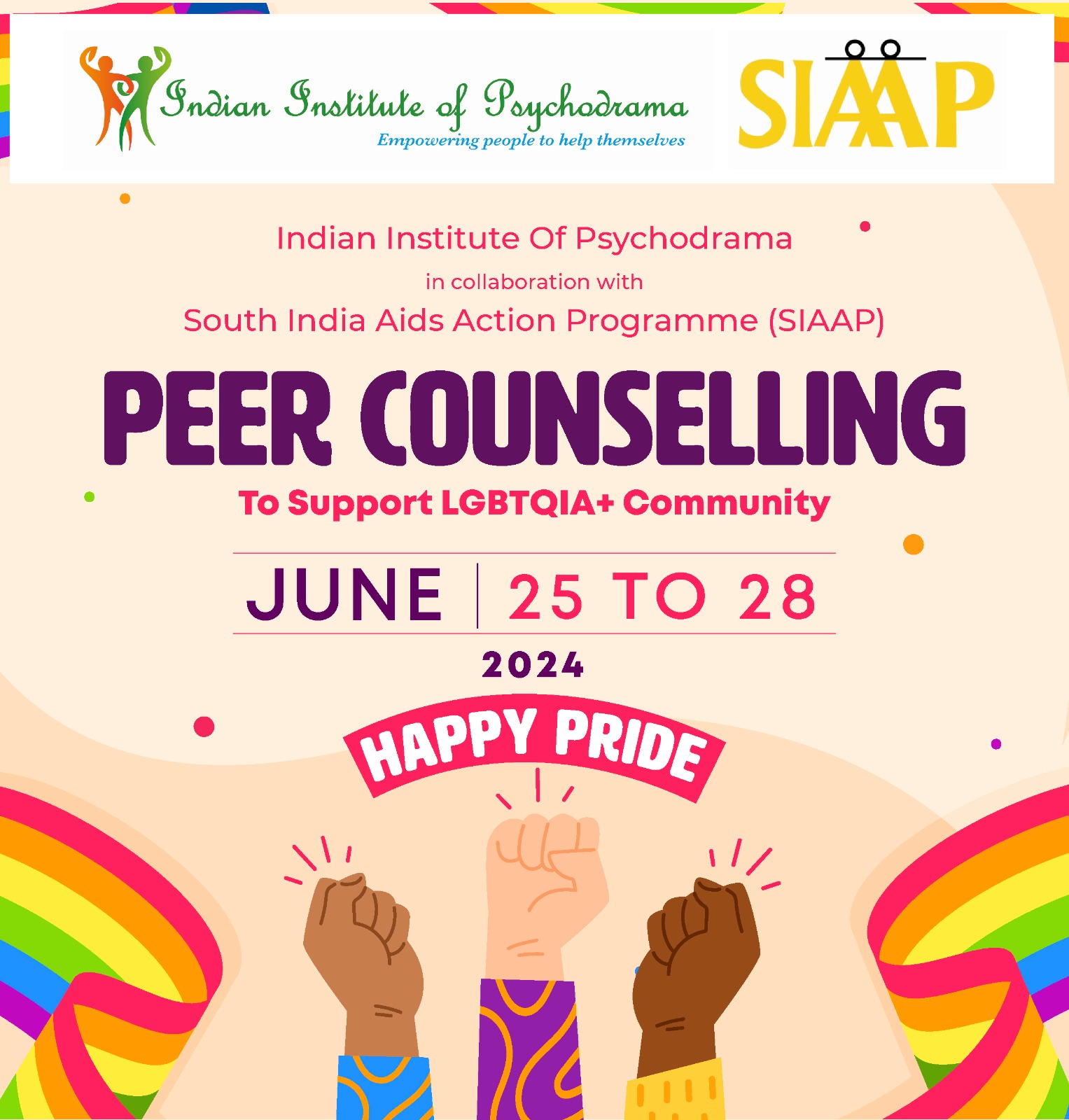PEER COUNSELLING 2024

Indian institute of Psychodrama in collaboration with South Indian AIDS action programme is hosting a Peer counselling session in Chennai from June 25 to 28 to support the LGBTQIA+ Community.
Location: Indian institute of Psychodrama, West Thousand lights, Chennai 600006
Dates: June 25, 26, 27 and 28 (2024)
What is Peer Counseling?
Peer counseling is a supportive service where trained individuals who share similar experiences or backgrounds provide guidance, support, and a listening ear to others.
Why Peer Counseling is Necessary and Essential for the Mental Health of the LGBTQIA+ Community?
- Shared Experiences and Understanding
Empathy and Validation: LGBTQIA+ peer counselors have firsthand experiences with issues related to sexual orientation and gender identity. This shared understanding fosters a deep sense of empathy and validation for those seeking support.
Safe Space: Peer counseling provides a safe and non-judgmental environment where individuals can freely discuss their concerns without fear of misunderstanding or discrimination. - Addressing Unique Mental Health Challenges
Minority Stress: The LGBTQIA+ community faces unique stressors, such as discrimination, stigma, and internalized homophobia/transphobia. Peer counselors are uniquely equipped to address these specific challenges.
Mental Health Disparities: LGBTQIA+ individuals are at a higher risk for mental health issues such as depression, anxiety, and suicidal ideation. Peer counseling offers targeted support to help mitigate these risks. - Building Community and Reducing Isolation
Sense of Belonging: Peer counseling helps individuals feel connected to a community of people who understand and accept them, reducing feelings of isolation and loneliness.
Community Engagement: It encourages participation in community activities and events, further fostering a sense of belonging and solidarity. - Accessibility and Trust
Lower Barriers to Support: Peer counseling is often more accessible and less intimidating than traditional mental health services, making it easier for individuals to seek help.
Trust and Rapport: Trust is built more easily with peer counselors who share similar life experiences, enhancing the effectiveness of the support provided. - Empowerment and Self-Advocacy
Empowerment: Peer counseling empowers individuals by helping them develop coping strategies, resilience, and self-advocacy skills.
Role Models: Peer counselors serve as role models, demonstrating positive ways to navigate challenges and live authentically. - Complementing Professional Mental Health Services
Supplementary Support: Peer counseling can complement professional mental health services by providing ongoing, informal support between therapy sessions.
Bridging the Gap: It can act as a bridge for those who may be hesitant to seek professional help, guiding them towards appropriate resources and services. - Encouraging Healthy Identity Development
Positive Identity Formation: Peer counseling supports individuals in exploring and affirming their sexual and gender identities in a positive and healthy manner.
Navigating Identity Challenges: It provides guidance on dealing with identity-related challenges, such as coming out, transitioning, and dealing with family or societal acceptance. - Promoting Mental Health Awareness and Education
Raising Awareness: Peer counseling initiatives often include educational components that raise awareness about mental health issues within the LGBTQIA+ community.
Reducing Stigma: By openly addressing mental health, peer counseling helps reduce the stigma associated with seeking help and discussing mental health issues.
Conclusion
Peer counseling is a crucial support system for the mental health of the LGBTQIA+ community. It offers empathetic, informed, and accessible support tailored to the unique challenges faced by LGBTQIA+ individuals. By fostering a sense of belonging, reducing isolation, and empowering individuals, peer counseling plays an essential role in promoting mental well-being and resilience within the community.
